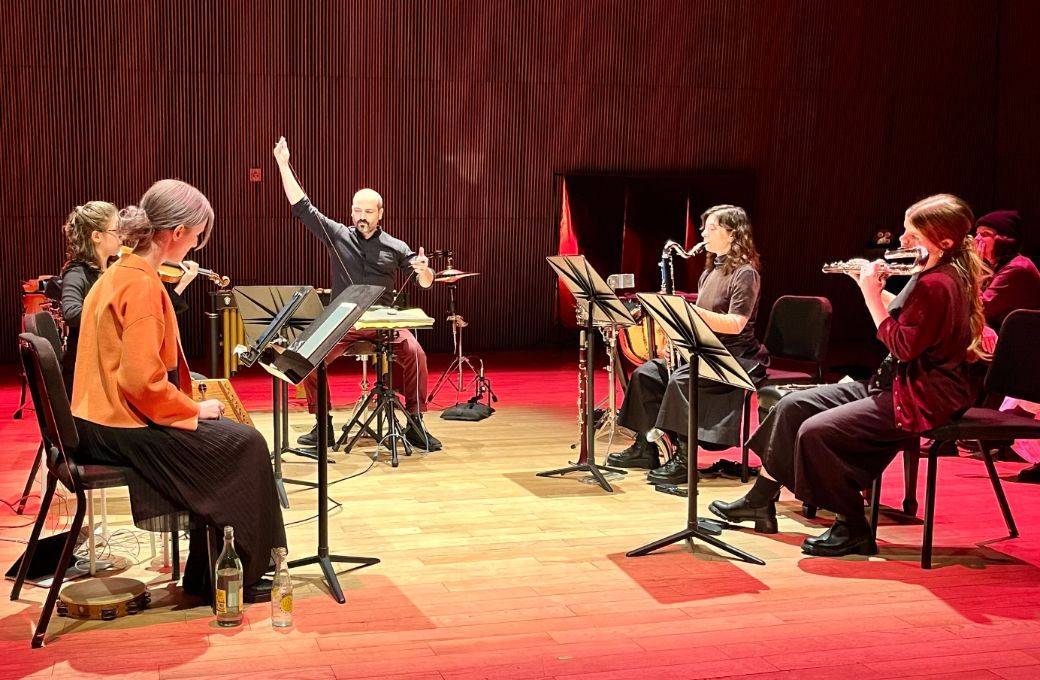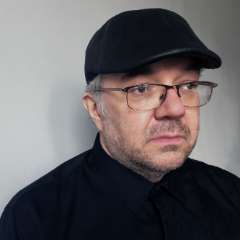New music groups don't have opening acts often enough. The nearly nude Qiujiang Levi Lu, blindfolded and with a headset and another microphone of sorts held inside the mouth, was the warm-up for TAK ensemble’s last concert of the year, performing an anguished solo that was more interesting for its ripples (decay, reverberation, feedback) than its splashes (primitive dance, growls and stomps). It was like the unknown band before the touring act, an unexpected diversion before the main act.

In truth, though, the main event was half discovery for me as well, as the first two composers on the program were unfamiliar names. Seare Ahmad Farhat’s Bring me your silence worked in small gestures and soft sororities for bass clarinet, bass flute and violin, with percussionist Ellery Trafford rubbing rocks together and soprano Charlotte Mundy blowing across and singing into a bottle of water. What was refreshing, though, was that it didn't seem aimed at challenging conventions. Although slow and quiet, the piece still worked with repeated and varied motifs and harmonic development. It was pleasantly comprehensible with no points to prove or arguments to make.
Zeynep Toraman's Veils followed quite nicely, with extended tones in (what seemed to be) more strictly metered counts – or at least more frequent, and growingly asynchronous, waves. It was a more static piece, as if we’d submerged below Farhat’s silence, and had me thinking about the name given to the program, “Holding”, which wasn’t addressed in the printed notes. Were we being cared for or were we simply stuck waiting? Was this a respite or a reserve? Either seemed likely as the other. [Flutist Laura Cocks would offer an explanation of the “Holding” banner (embrace, not limbo) and the need for togetherness in troubled times before the final piece.]
The players had been seated but now stood for Inti Figgis-Vizueta’s Form the fabric, which began in long, overlaid lines but quickly grew to seem almost violent, with shrill attacks and chaotic outbursts. Trafford’s vibraphone, struck as often with stick as mallet head, dominated a frenetic unease, then disappeared, clearing space for an unaccompanied passage from Marina Kifferstein’s violin. As the ensemble began to build again, it seemed to carry a sense of false security. The embrace of the first two chapters of the program had been ripped away in a way that was palpable and gripping.
The first three pieces had run roughly ten minutes each. Eric Wubbels’s Root and Vein was not just longer but louder. The piece was excerpted from Wubbels’ Interbeing, a concert-length open-form composition developed with TAK over eight years and premiered in in the same venue in 2022. It’s a work that’s very much about the comforts of home and community, a cozy feeling that dominates my recollections of the premiere. The heavy introductory count, yelled by the players and beaten in common time on drums, jarred my memory. Visceral and exciting, pretty literally a blast, it struck a stark contrast with the preceding works, which speaks to the smart programming of the night. Other sections would have fit more easily, but the fast, insistent lines across flute, violin and Madison Greenstone’s clarinet and hyper-Reichian progressions in tuned percussion and Mundy’s impeccable voice brought smiles around the room. In a sense, it still felt like home.


